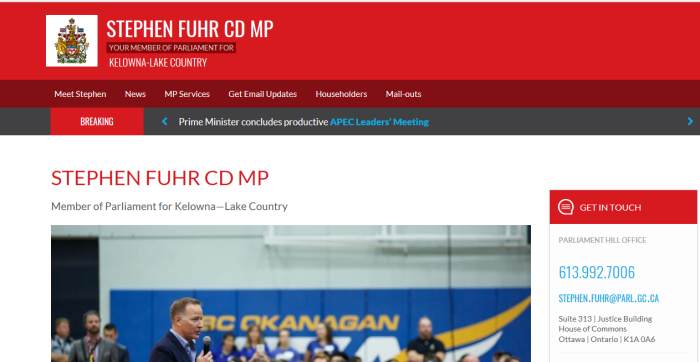
(Kelowna-Lake Country M.P. Stephen Fuhr)
It would be nice to actually talk to a government M.P. Kelowna-Lake Country M.P. Stephen Fuhr is not too far from here. With the ongoing matters, particularly with the Canada Post legislation, he has been away from home. Anyway, this was done to gain information on 5 topics
(a) Bill C-71 (firearms)
(b) Bill C-75 (criminal code)
(c) Bill C-76 (elections)
(d) UN Global Migration Compact
(e) Supply Management
I did email him 5 questions. Questions are in regular text, answers are in bold/italics:
Hello
I had some some questions/concerns about some policies that were ongoing
(1) This Bill C-71, if what I read is right, it looks like re-establishing a gun registry. Is that the case?
With regards to your first question on Bill C-71, the government has been clear we would not re-instate the national long gun registry and have kept that commitment. C-71 fulfills our government’s campaign promise to address gun control and to take action to combat criminal gun and gang violence.
As a result Bill C-71 will make five important changes:
First, it will enhance background checks. It will remove a five-year limitation so an applicant’s full record is considered, helping ensure that those with history of violent or criminal behaviour, or mental illness associated with violence, can’t get a firearms licence.
Second, C-71 will require all sellers to confirm that a buyer’s licence is valid before the purchase of any firearm, including a rifle or shotgun. Oddly, that’s currently voluntary under the law, and only mandatory for restricted and prohibited firearms. While many still ask, by law retailers only need to have “no reason to believe” the buyer does not have a valid licence.
To be clear, it’s the buyer’s license, not the firearm, that’s being verified. This is not a long gun-registry: no information about the firearm is exchanged.
Third, the legislation will help police investigate gun-related crimes by requiring stores to maintain records of their sales, as was the case in Canada from 1979 until 1995 (and in the United States since 1968). Most already do so for safety and liability reasons, and because it affects their insurance.
Store records are private, not accessible to governments, but police would be able to gain access given reasonable grounds and with judicial authorization as appropriate. These records will help police trace guns discovered at a crime scene and detect trafficking.
Fourth, the bill will ensure the accurate and consistent classification of firearms by RCMP experts in accordance with the technical criteria in the Criminal Code. It repeals Cabinet’s existing authority to overrule RCMP determinations, taking political considerations out of the process.
Fifth, C-71 will bolster community safety in relation to the most dangerous firearms by requiring specific authorizations whenever restricted or prohibited guns (mostly handguns and assault weapons) are moved through the community—except between a residence and an approved shooting range. The rules for transporting non-restricted firearms (such as rifles and shotguns) will not change.
Separately, and in addition, the Government has also taken action to help combat criminal gun and gang violence committing up to $327.6 million over five years, and $100 million annually thereafter, to help support a variety of initiatives to help communities reduce criminal gun and gang crime.
(2) Bill C-75, making terrorism a summary offence? How can that be?
Bill C-75 is a substantive response to the Supreme Court of Canada (SCC) July 2016 decision in R v Jordan, which called on all those within the justice system to work together to address the issue of court delays.
As you may know, the failure of the judicial system to be able to provide justice in a timely manner has resulted in some serious cases being stayed, which many would argue does not make communities feel safer.
Following the decision in Jordan, federal-provincial-territorial ministers and officials collaborated to work on solutions to address delays in the criminal justice system. This bill is intended to bring about a culture shift within the criminal justice system, something the Supreme Court in the 2016 Jordan decision has stressed is required. As the criminal justice system is shared by all levels of government, accordingly, many of the reforms proposed in this legislation reflect collaborative efforts to address court delays, and have been identified as priorities by federal, provincial, and territorial Justice Ministers.
With regard to the legislation and certain offences, it is important for Canadians to know that in deeming certain offences as hybrid offences, the offence remains an indictable offence unless the Crown elects to proceed by way of summary conviction.
In undertaking the Government’s Criminal Justice System Review, the Minister of Justice and her Parliamentary Secretary held Canada-wide roundtable discussions in every province and territory with justice system partners and interested parties. Participants also included victim advocates, restorative justice proponents, representatives of front-line community support systems, and importantly, representatives from areas such as health and mental health, housing, and other social support systems. In these meetings, participants raised pressing issues about the criminal justice system.
With this legislation, our Government is taking an important step forward to act on what we heard and create a criminal justice system that is just, compassionate, and timely and reflects the needs and expectations of all Canadians
(3) Bill C-76, getting rid of voter ID requirements….? Again, hoping that I am reading this wrong
On the issue of voter identification and Bill C-76, the bill will reintroduce the Voter Information Card as a piece of identification someone can use when they vote. We encourage you read the following Baloney Meter article which provides more information on the importance of the Voter Identification Card: https://www.ctvnews.ca/politics/baloney-meter-is-voter-information-card-a-doorway-to-electoral-fraud-1.3933707 .
(4) Also, there is the UN global migration compact that I keep hearing about. Why the heck would we even consider giving our sovereignty to the UN?
With regards to the Global Compact for Safe, Orderly and Regular Migration, there is a great deal of misinformation and misunderstanding surrounding this issue and we wish to dispel the myth that Canada’s borders are open; our borders are secure, ensuring an orderly migration system that protects the safety of Canadians while respecting our international obligations to legitimate asylum seekers.
In light of your concerns, we encourage you to read the following column written by our Minister of Immigration, Refugees and Citizenship, Minister of International Development, and Canada’s UNHCR Representative: https://www.macleans.ca/opinion/why-canada-will-lead-the-charge-on-the-uns-global-refugee-plan/ .
Canada has a longstanding history of welcoming refugees and people in need from around the world, including some of the world’s most vulnerable people trapped in often unsafe or violent situations in their home country that are outside of their control. As the number of displaced persons reaches unprecedented levels, the Government of Canada remains committed to upholding its humanitarian tradition to resettle refugees and offer protection to those in need.
(5) When NAFTA was getting renegociated, Trump made comments about how our dairy industry is rigged to prevent competition. Is this true, and doesn’t that violate the principle of free trade? It’s infuriating that my food costs twice what it should
Finally, with regard to your question about supply management and the cost of dairy products for Canadian consumers, our dairy industry sustains 221,000 Canadian jobs and contributes $19.9 billion to our GDP and for that reason the government remains committed to maintaining Canada’s supply management system. That being said, through Canada’s commitments under the WTO, CETA, CPTPP, and USMCA, Canadian farmers and processors maintain approximately 90% of the Canadian dairy market, while foreign dairy suppliers will have the opportunity to compete for a share of the Canadian market equivalent to approximately 10% of Canadian milk production. In this way we support our farmers and processors, maintain consumer confidence that the dairy products they consume are made in Canada, while giving consumers more choice through a more competitive market place.
Some clarity on these would be nice.
Thanks
Alex
Thank you again for writing to Mr. Fuhr. We trust that this information will be useful in addressing your concerns.
Sincerely,
The Office of Stephen Fuhr, CD, MP
Member of Parliament for Kelowna-Lake Country
Room 313 Justice Bldg.| Ottawa, ON, Canada K1A 0A6
Email: stephen.fuhr@parl.gc.ca
Tel: 613.992.7006 | Fax: 613.992.7636
While Mr. Fuhr did send a lengthy email back, there were some positives and negatives. Regarding the UN Compact, I was directed an article the Immigration Minister submitted to Maclean’s magazine.
It is nice to get information straight from the source, but the article reads like a puff piece, that glosses over many legitimate questions about the compact. Indeed, for such a project to even be considered, a lot of details need to be worked out and then disclosed. Here is my followup email to Mr. Fuhr’s office (in italics).
Note: If and when a response ever comes, it will be posted in its entirety.
Hello,
Yes, it was informative, in some sense. But with regards to the UN global migration pact, I actually found the content of the Macleans article to be more alarming.
(1) The immigration minister keeps referring to ”refugees”, yet the UN compact keeps referring to ”migrants”. This seems to be a blurring of the lines here. Are we taking refugees, or migrants? Further, how many do you plan to take?
(2) As with people coming across the border from New York and Minnesota, Hussan got offended at the notion these were ”economic migrants”, calling it ”divisive”. However, once you travel from one safe country to another, then they are in fact economic migrants. It is an accurate description.
(3) Europe, in particular, Germany and Angela Merkel, has had lots of problems with this issue since 2015. How would this be different?
(4) There seems to be little mention in the UN compact of assimilating to the host culture.
(5) There is no real mention in the UN compact of screening or background checks. Ibrahim Ali rings a bell.
(6) There is no mention of how the host country would meet these costs.
(7) While the Macleans article referenced work and entrepenuership, the UN compact makes little mention of work or self-sustaining. Would Canada expect they work, or is it welfare?
(8) The Macleans article promotes Middle East/Africa as locations. However, given treatment of women/LGBTQ, as well as FGM, honour killings, etc…. in those locations, how can we ensure the safety of Canadians?
(9) What health measures are in place to prevent any possible infectious diseases? There is always that risk from any foreign travel.
(10) As for sovereignty, are we in control of our country, or does the UN call the shots?
Far from being re-assuring, the lack of detail in the compact, and from the immigration minister make me wonder what exactly we are getting into. Does this not cause concern that we are signing over our sovereignty for something so vague?
Alex
At the time of publication, this followup had been sent to his office 5 days prior. Again, any response will be posted. And if he agrees to a telephone or in person meeting, the full content will be disclosed.



